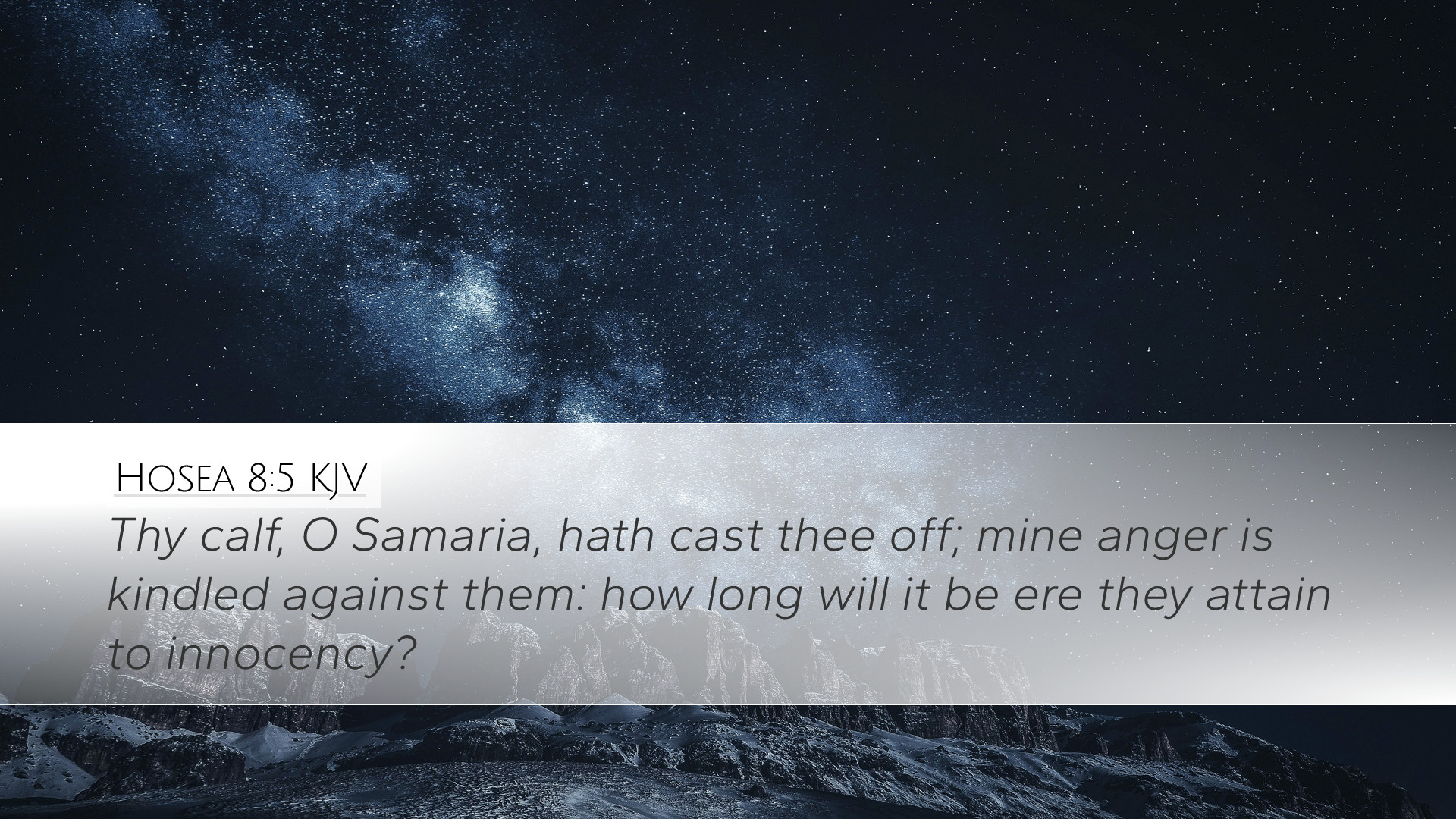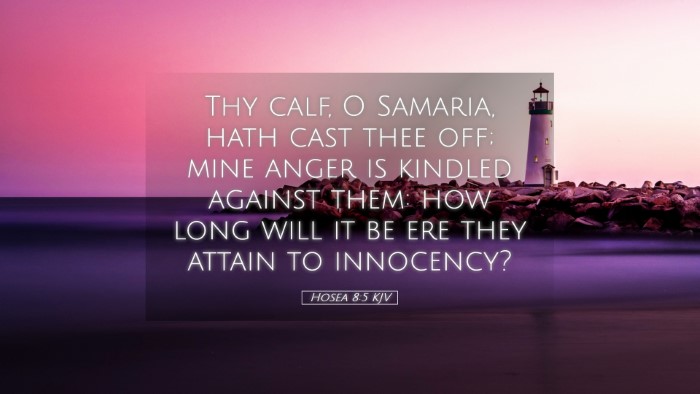Old Testament
Genesis Exodus Leviticus Numbers Deuteronomy Joshua Judges Ruth 1 Samuel 2 Samuel 1 Kings 2 Kings 1 Chronicles 2 Chronicles Ezra Nehemiah Esther Job Psalms Proverbs Ecclesiastes Song of Solomon Isaiah Jeremiah Lamentations Ezekiel Daniel Hosea Joel Amos Obadiah Jonah Micah Nahum Habakkuk Zephaniah Haggai Zechariah MalachiHosea 8:5
Hosea 8:5 KJV
Thy calf, O Samaria, hath cast thee off; mine anger is kindled against them: how long will it be ere they attain to innocency?
Hosea 8:5 Bible Commentary
Commentary on Hosea 8:5
Bible Verse: “Your calf, O Samaria, has cast off his maker. My anger is kindled against them; how long will it be until they attain to innocence?” (Hosea 8:5, ESV)
Introduction
The Book of Hosea stands as a poignant message of God's love and judgment toward unfaithful Israel. Hosea 8:5 captures the essence of the divine displeasure concerning idolatry and the rebellion of God’s people. In this commentary, we draw insights from various public domain scholars to impart a deeper understanding suitable for pastors, students, theologians, and Bible scholars.
Contextual Background
In the Northern Kingdom of Israel, Samaria had become the political and religious center that turned away from God. The Israelite people were engaging in idol worship, particularly the worship of the golden calf. This chapter expresses God’s grief over their abandonment of His ways and reflects the profound consequences of such unfaithfulness.
Analysis of the Verse
-
The Calf of Samaria:
Hosea refers to the “calf” as a direct reference to the idol that had been established in Bethel and Dan, akin to the one created by Aaron in Exodus. Matthew Henry notes that this calf, representing a corrupted version of worship, serves to illustrate how Israel had forsaken the true God, illustrating their spiritual and moral decline.
-
Cast Off His Maker:
This phrase reveals the tragic reality of Israel’s rejection of their Creator. Albert Barnes emphasizes that the people, in their idolatry, are not merely abandoning their God; they are rejecting the creator-engineered purpose of their existence. The act of casting off is both physical and spiritual, symbolizing the complete alienation felt in the relationship between Israel and Yahweh.
-
God’s Anger:
Hosea conveys God’s divine wrath against the spiritual adultery taking place. Adam Clarke elaborates that God’s anger symbolizes His righteous judgment. This anger arises from deep love, as God desires a faithful relationship with His people. It serves as a warning of impending judgment if the people do not repent and return to Him.
-
Attaining Innocence:
The latter part of the verse poses a rhetorical question regarding how long it will be until they attain to innocence. This inquiry illustrates the desperate hope in God’s call to repentance. The tone suggests impatience, as the sins of the people have amassed to a point of urgency. Henry comments on the possibility of redemption, emphasizing that God yearns for their reconciliation and for them to return to purity.
Theological Insights
This verse raises several theological themes prevalent throughout Scripture: the nature of God’s anger, the seriousness of idolatry, and the redemptive hope offered to sinners. Understanding these themes is crucial for anyone studying the text.
-
The Nature of Divine Anger:
God’s anger is not arbitrary but is rooted in His holiness. The divine drama unfolding in Israel acts as a warning for contemporary believers about the consequences of idolatry in all its forms. Pastors should emphasize the importance of maintaining an authentic relationship with God rather than succumbing to cultural or personal idols.
-
Idolatry in Modern Context:
The modern-day equivalent of the calf of Samaria may not be a physical idol, but rather the distractions and priorities that draw individuals away from God. Clarke highlights that believers must be vigilant to guard against contemporary forms of idolatry. The idolatry of self, materialism, and secularism can easily eclipse the pursuit of God’s righteousness.
-
Hope for Redemption:
Despite the grim pronouncements, there is an underlying current of hope throughout the message. God is ever-ready to receive back the wayward. This invites pastors and leaders to provide hope and affirm that God’s kindness leads to repentance. The call for attaining to innocence serves as a reminder of God’s redemptive plan through Christ.
Practical Applications
Hosea 8:5 serves as a meaningful text for spiritual reflection and practical application. The insights gained from this verse can guide today's Christians in understanding their relationship with God more fully.
-
Self-Examination:
Believers should regularly examine what ‘calves’ may exist in their lives that draw them away from God. This self-reflection can lead to increased spiritual maturity and integrity.
-
Embrace Repentance:
Emphasizing the importance of repentance, church leaders can encourage congregants to return to a state of innocence through confession and renewal of their commitment to God, as the grace of God is always available for those who seek forgiveness.
-
Faithfulness in Worship:
Worship must align with the truth of Scripture. Pastors should be careful to teach sound doctrine to guard against the syncretism that plagued Israel, ensuring that worship does not become a mere formality but a heartfelt response to God’s love.
Conclusion
The message of Hosea 8:5 stands as a timeless reminder of the dangers of idolatry and the profound nature of divine anger intertwined with love and hope for redemption. By examining God's heart in this passage, believers are encouraged to pursue intimacy with their Creator and to maintain a vigilant heart against the allure of false idols.


